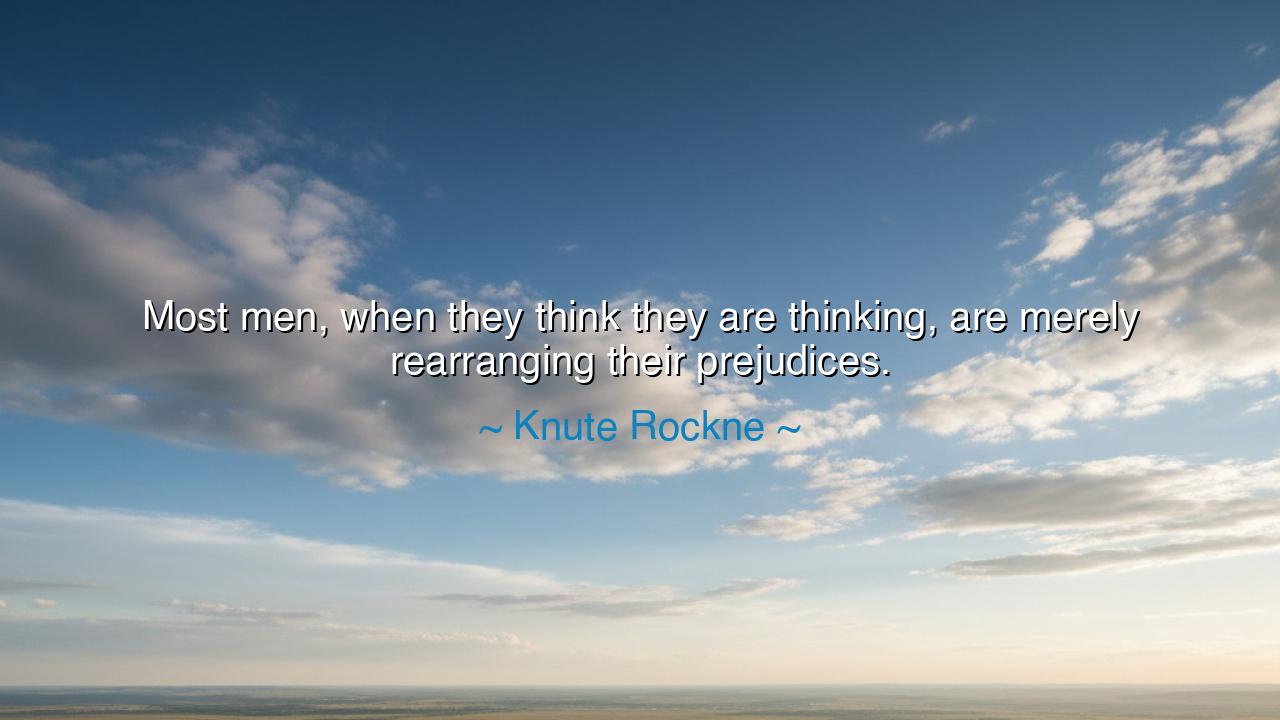
Most men, when they think they are thinking, are merely






The words of Knute Rockne cut like a blade through the illusions of the human mind: “Most men, when they think they are thinking, are merely rearranging their prejudices.” In this saying, we are reminded of the frailty of human reason and the cunning disguise of bias. For it is easy to believe that we are guided by pure thought, but in truth, our minds often circle around the same old beliefs, reshaped and polished, yet never truly examined. Prejudice clings to us like shadow, and what we call “thought” may be nothing more than its shifting form.
The ancients knew this danger well. Socrates, who called himself the wisest of men because he knew he knew nothing, warned his followers that to be certain without examination was to live in blindness. Prejudices are like chains of the mind—unseen, yet binding—and those who never question them mistake their own prison for wisdom. Rockne, though a coach and not a philosopher, spoke here with the same insight: that most men do not truly think, they merely defend the familiar in the guise of reasoning.
History gives us grave examples. When Galileo looked through his telescope and declared that the Earth moved around the Sun, many of his learned peers rejected him outright. They believed themselves to be thinking, but in truth they were only protecting the prejudices of centuries. They rearranged arguments, they cited old texts, they repeated familiar doctrines—but none of it was true thought. True thought requires courage: the courage to let go of what one has always believed in order to seek what is real.
And yet, there is something deeply human in this weakness. For to abandon prejudice is to abandon certainty, and the heart craves certainty as the body craves bread. To think freely is to risk standing alone, apart from the crowd, as innovators and prophets so often have. This is why Rockne’s words ring with warning: beware of confusing comfort with wisdom, and beware of calling prejudice by the noble name of thought.
Consider Abraham Lincoln, who in his youth inherited the prejudices of his time, yet through reflection and struggle grew into a leader who could see beyond them. He once said, “As I would not be a slave, so I would not be a master,” a thought that defied the common biases of his day. He did not merely rearrange what society handed him—he broke free, and in doing so, altered the course of history. Such is the power of true thinking when it escapes the chains of prejudice.
The lesson is this: do not trust every thought that enters your mind as truth. Question it. Examine where it comes from. Ask whether it is born of evidence, compassion, and clarity—or whether it is simply the echo of tradition, habit, or fear. For only in such questioning does one approach wisdom. To think is not to polish what one already believes, but to be willing to set aside belief in the pursuit of what is real.
Practical action lies before us: read widely, especially from those who disagree with you. Seek out voices from other lands, other times, other walks of life. When you feel certain, pause and ask: is this conviction the fruit of truth, or the comfort of prejudice? In conversation, listen more than you speak, and when you speak, let humility temper your words. In this way, your mind becomes not a fortress of prejudice, but a garden where true thought may grow.
So let us remember Rockne’s wisdom: thinking is not the same as rehearsing what we already believe. To think is to be brave, to challenge oneself, to endure discomfort in the search for truth. Few men do it, but those who do change the world. Let us strive to be among them.






AAdministratorAdministrator
Welcome, honored guests. Please leave a comment, we will respond soon